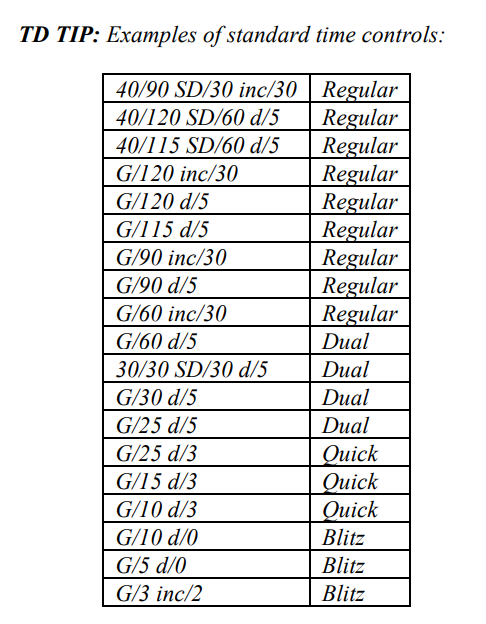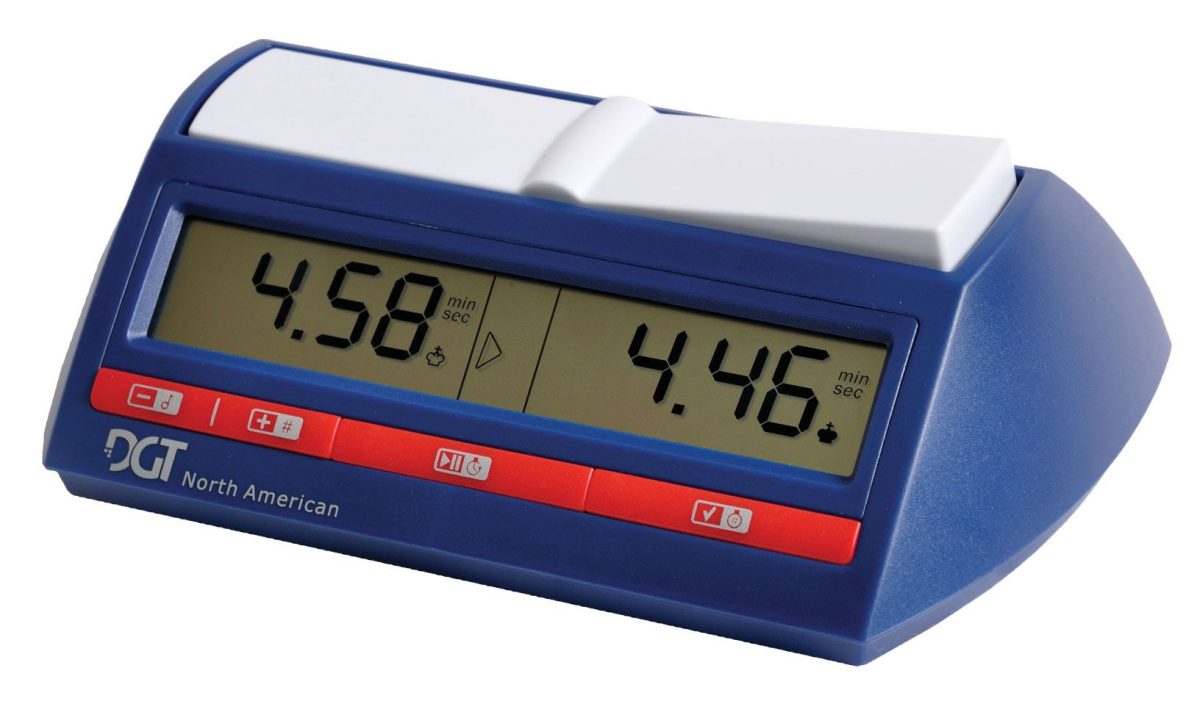The US Chess Federation website isn’t too clear on the differences in the three time controls that show up on your page:
- Regular
- Quick
- Blitz
For those used to online play and the time control categories there, the USCF time control descriptions map this way:
- Regular = Classical
- Quick = Rapid
- Blitz = Blitz (minimum of 3+2, anything lower cannot be rated)
OK, that’s great. But what specific time controls correspond with these descriptions? Here’s a breakdown of what USCF Regular, Quick, and Blitz mean.
First, How Increment Works
Increment is the amount of time added to the clock for every move – initially developed and popularized by Bobby Fischer. Increment plays an interesting role in how formats are classified!
This part upcoming can be a bit confusing – I’m going to explain it via a formulaic/algebra-based method to try and simplify it. So, we’ll define a few variables:
- X = Increment, in Seconds
- Y = Base Time, in Minutes
- Z = Total Time, mixed denominator
For this formula, you simply add X and Y to get Z, ignoring the units. This means that a time control of 30 minutes base and 15 seconds increment would give us a Total Time value of 45, not 30 minutes and 15 seconds.
Here are there more examples, since I bet you’re a bit confused.
- G/15 + 10 is 15 minutes base, 10 seconds increment, for a total time of 25
- G/90 + 30 is 90 minutes base, 30 seconds increment, for a total time of 120
- G/120 + 15 is 120 minutes base, 15 seconds increment, for a total time of 135
Simply ignore the units of time measurement. Sound strange? I know, but this is how it works!
This also applies to delay, not just increment, but we’ll call it increment for the remainder of the post.
What is USCF Regular Time Control?
USCF Regular corresponds with the Classical time format that we all know and love – often known as “slow chess.”
Any Total Time value of 30 or more will make the games count as USCF Regular games. That means the following time controls will count as rated regular games under the USCF charter:
- G/30 + 0, 30 minutes base, 0 seconds increment, total time is 30
- G/90 + 10, 90 minutes base, 10 seconds increment, total time is 100
- G/120 + 30, 120 minutes base, 30 seconds increment, total time is 150
It is highly recommended that the base time is at least 30 minutes by the USCF, but G/25 + 5 would also qualify for regular rated games. This would be considered abnormally short, however.
(See Rule 5Fa per the US Chess rules)
What is USCF Quick Time Control?
USCF Quick corresponds with the Rapid time format that is very popular online.
Any Total Time value between 10 and 65 will make the games count under USCF Quick games. That means the following time controls will count as rated quick games under the USCF charter:
- G/10 + 10, 10 minutes base, 10 seconds increment, total time is 20
- G/30 + 0, 30 minutes base, 0 seconds increment, total time is 30
- G/45 + 15, 45 minutes base, 15 seconds increment, total time is 60
Wait… doesn’t that overlap with some Regular games?
I know what you’re thinking – wait a minute, G/30+0 qualifies for regular rating, not quick rating! While you are right, I am also correct. That means there are a lot of games that can be dual-rated for both Regular and Quick under the USCF rules.
What are some examples of dual-rated chess time controls? These all count for your both Regular and Quick ratings:
- G/30 + 0, 30 minutes base, 0 seconds increment, total time is 30
- G/45 + 5, 45 minutes base, 5 seconds increment, total time is 50
- G/55 + 5, 55 minutes base, 5 seconds increment, total time is 60
South Sound Chess often runs dual-rated events so players can get both Regular and Quick ratings.
What is USCF Blitz Time Control?
While South Sound Chess does not usually run rated Blitz chess events due to their higher costs, USCF Blitz events have a Total Time between 5 and 10, with the fastest possible time being G/3+2, or 3 minutes base, 2 seconds increment. Anything faster than that cannot be rated under the USCF system.
In theory this means that a G/10+0 game is dual rated for both Quick and Blitz, because this is how the USCF handbook itself defines the time controls. However, this is not actually true, and G/10+0 will be Blitz-Only, not Quick+Blitz. It is not clear why the handbook contradicts itself in this regard, but just know that it is impossible to dual-rate Blitz + Quick by the USCF.
The following time controls qualify for USCF Blitz:
- G/3 + 2, 3 minutes base, 2 seconds increment, total time is 5
- G/5 + 0, 5 minutes base, 0 second increment, total time is 5
- G/7 + 2, 7 minutes base, 2 seconds increment, total time is 9
Wrapping up Time Controls
Here’s what the USCF says themselves in the handbook:
Regular only: Total playing time for each player is greater than 65 minutes (mm+ss > 65).
Dual (both regular and quick): Total playing time for each player is from 30 to 65 minutes (30 < mm+ss <65).
Quick only: Total playing time for each player is more than 10 and less than 30 minutes (10 < mm+ss < 30).
For Regular, Dual and Quick the primary time (mm in minutes) must be at least 5 minutes.
Blitz: Total playing time for each player is from 5 to 10 minutes inclusive and the primary time control must be at least 3 minutes. 5 < mm+ss < 10.
All rounds must use the same time control.
And here’s an example chart the USCF gives on sample time controls:

Hopefully this blog post makes it a bit clearer than the USCF does! South Sound Chess will run events in all three time format, so be sure to check our Chess Events Page for chess games local to the Seattle and Tacoma areas of Washington State!
